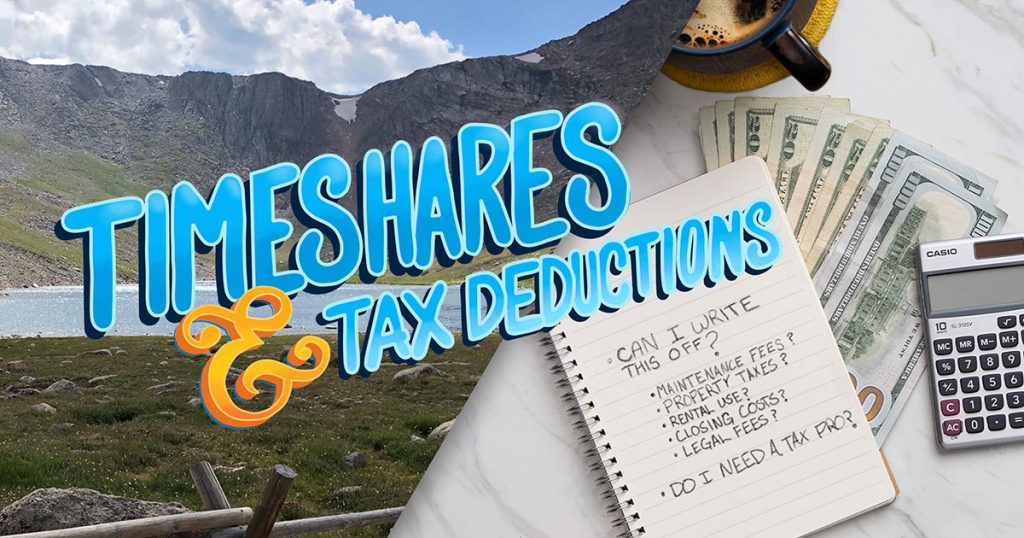As your timeshare costs grow, you may be wondering how it all fits into your tax picture. The good news is that some of your timeshare costs are tax deductible. But others are not. To be sure you know what can and can’t be written off, let’s break down the legal tax deductions for your timeshare.
Loan Interest Expenses
Maybe the only thing you ever expected from your timeshare was an annual week somewhere beautiful and a break from all your troubles. But if you’re like most owners, you probably ended up borrowing money to get a timeshare in the first place. And let’s be honest—it’s hard to enjoy the beach when you’re drowning in debt.
Unfortunately, if you bought your timeshare with a loan from the timeshare company itself or with a credit card—and that’s a whole different sermon—you won’t be able to deduct the loan interest.
However . . .
Secured Loan Requirement
Here’s something to lighten the load a little: If your timeshare loan is secured, the interest you paid on it will usually be tax deductible! But what does “secured” mean? In case you don’t know the difference from the original purchase loan, a secured loan is either:
- A home equity loan you borrow against your primary home to finance a timeshare, or . . .
- A loan that uses your deeded timeshare week as the security, or collateral, for the loan.
If you have a secured loan for your timeshare, you can write the interest off. We never recommend debt, but if your loan is secured, you can at least alleviate a bit of the financial pain by writing off the interest.
So why did we say the interest expenses on secured timeshare loans are usually deductible? Because there’s an exception. (Of course there is.) You will not normally be able to deduct the interest paid if your timeshare week is through a long-term lease, also known as a “right-to-use” or “points-based” arrangement.
To guarantee you’ll be able to take advantage of this deduction when filing, be sure your deeded week appears in the loan document as the security for the loan. If it doesn’t, be prepared to get a document from the seller clearly stating that your deeded week is the loan’s security.
Maintenance Fees
Sorry to say, your maintenance fees are not deductible. The resort where you have a timeshare uses these fees to pay for everything from landscaping to amenities and business costs, and the average annual cost is around $1,000.1 In case you haven’t noticed, fees tend to rise by 5% a year. So not only are they ineligible for a tax write-off, they’re only going to be more of a budget buster as time goes by.
There is one tax exception for maintenance fees. You can write them off if, and only if, you paid them while renting out the timeshare to other people.
Property Taxes
Yes, you can get a deduction from the property taxes you pay on your timeshare. Just be sure you follow the rules to make it stick:
- The taxes assessed must be separate from any maintenance fees (the two are sometimes lumped together in timeshare bills).
- You may need to request an itemized statement from your timeshare management to prove you paid property taxes.
- Note that the property tax on your timeshare may be assessed to the entire resort, or as part of a tax parcel larger than your individual share. If that’s you, you’re not responsible for the tax—but you also can’t use the tax as a deduction.
- If you own more than one timeshare, you’ll want to speak to a tax professional about the number of individual deductions you can take. Just be sure you get as many deductions as you’re allowed!
Rental Use
Renting out your timeshare? You should know that you’ll nearly always need to report that income when filing with the IRS. But you may be eligible for a tax deduction. The IRS has a few limits and rules about which rental expenses are tax deductible:
- If the rental is not for profit, you can only deduct expenses up to the amount of your rental income.3
- Another non-profit rule: Expense amounts above the annual rental income don’t roll over to become deductible in the following tax year.4
- You’ll have fewer limits on deductions if the rental income is for profit. One thing to note is that expenses from your personal use of the timeshare aren’t deductible.5
- Be aware that if you’re renting the property to relatives, it can only be deducted if they’re using it as their main home and they’re paying you rent that’s equivalent to fair market value.6 In other words, you can’t dodge taxes here by “renting” your timeshare out to your Cousin Darrell for his annual Florida fishing trip.
Closing Costs and Legal Fees
No matter how steep the closing costs were on your timeshare, the bad news is they’re not deductible for tax purposes. Legal fees are also ineligible for a write-off.
Donation Amount
What about giving your nightmare . . . err, timeshare away to charity? If you donate it, you will be eligible for a tax rebate in the amount of your property’s fair market value. To be sure your claim flies with the IRS, you’ll need to have an independent appraisal done and keep that documented.
Talk to a Tax Pro
Timeshares have a lot of rules and regulations—especially in the tax realm. To be sure you get the tax help you need and the money you deserve, you’ll want to connect with one of our Endorsed Local Providers (ELPs) in your area for tax help today.
Read the full article here











